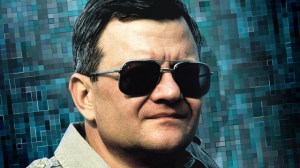Famous author Tom Clancy, who died yesterday at age 66, was pretty rude to me during my one and only interview with him. Back in 1996, when I was at The Wall Street Journal and he was starting his first video game company, Red Storm Entertainment, I asked if he had run out of bad guys since the Cold War had ended.
He became famous with The Hunt for Red October and Red Storm Rising in the 1980s. It was a logical question to ask since the Soviets were no longer the enemies of the day. As I remember, Clancy shot back, “I’ve written five novels since the Berlin Wall came down. You figure it out.” His PR folks later told me they decided not to put Clancy in front of any more reporters after that interview.
But Clancy was right. The world was a lot more dangerous a place than I had imagined in those days before 9/11. He predicted the rise of terrorism and wrote about antiterror organizations such as Splinter Cell and Rainbow Six that would have to be created in order to combat it. He expressed these predictions in novels that were engrossing. They created an impact that was far more memorable than any lecture could deliver. And the games truly brought that fiction to life.
Red Storm created Tom Clancy’s Rainbow Six in 1998 and Tom Clancy’s Ghost Recon in 2001. The Splinter Cell series debuted in 2002. All are shooter franchises. Red Storm was acquired in 2000 by Ubisoft, the French video game publisher that might very well have made Clancy more famous than his books did for a new generation of fans. All told, Clancy inspired 39 video games across 17 years. Those games have sold 76 million copies, generating billions of dollars in revenue.
That’s an astonishing legacy that will live on with the upcoming releases of Tom Clancy’s Rainbow Six: Patriots and Tom Clancy’s The Division in 2014. Ubisoft will continue to make products that carry Clancy’s name, which has become a brand unto itself.
“The teams at Ubisoft, especially at the Red Storm studio, are incredibly grateful to have collaborated with and learned from him, and we are humbled by the opportunity to carry on part of his legacy through our properties that bear his name,” said a statement from Ubisoft’s Facebook page.
Clancy’s and Ubisoft’s extensive research led to imaginative new weaponry that was grounded in the reality of modern warfare. The gadgets of modern techno-warfare were devastating, but they never seemed as ridiculous as James Bond’s secret weapons. That gave the books and games a level of authenticity that kept fans — including me — coming back. Clancy and Ubisoft took the game mechanics of stealth to a new level, bringing a sophistication to video games that had previously oversimplified global terrorism and how to fight it.
I didn’t like the thought of giving Clancy my money, but my passion for video games brought me back into the Clancy universe. His books and games often had heroes who defied orders in the name of saving lives. Clancy was very anti-establishment in that respect, and he had a respect for the soldiers and secret operatives who got the jobs done, often at great personal sacrifice. The narratives in the Clancy games presented you with ethical choices. You could choose whether to move in on an enemy in stealth or go in with guns blazing. You could kill in total silence, like a panther, or sneak by enemies, like a ghost.
That style of play and the choices for dealing with enemies was the hallmark of Ubisoft’s most recent game, Tom Clancy’s Splinter Cell: Blacklist. In that game, you play Sam Fisher, a rogue agent who is the last hope for saving the world from a terrorist group. As you pursue the terrorists in a variety of missions, you decide whether you’re going to be a ghost, leaving your enemies unconscious but alive; a lethal panther, killing efficiently and only when necessary; or an inelegant and brutal combat lover.
Other games adopted this kind of style, too, but the Clancy games managed to combine the right level of fun, strategy, authenticity, and sophistication. In the Clancy titles, the story wasn’t simply a pretext for shooting and killing. The story was one of the reasons that you played the game. You had to think about the best way to tackle the game in order to get the narrative outcome that you wanted.
In forcing players to think more, Clancy had a positive effect on a whole generation of gamers. He warned that we should not trust our government or superior officers just for the sake of obedience. His stories warned us about what could go wrong with high-tech weaponry if it fell into the wrong hands. He made us better players. For that, I’ll happily forgive his rudeness to a reporter who was part of the media establishment.
VentureBeat's mission is to be a digital town square for technical decision-makers to gain knowledge about transformative enterprise technology and transact. Learn More

